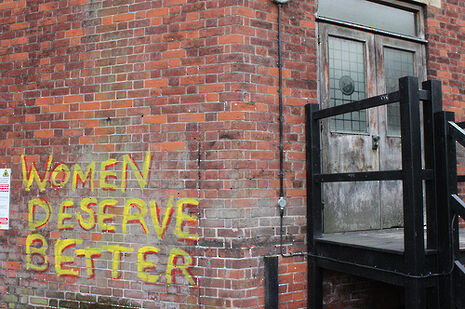The good, the bad, and the jelly
Olivia Bernhardt-Brogan wades into the world of the Women’s Campaign

I feel exceedingly intimidated stepping onto the tintack-strewn floor that is feminist debate in Cambridge today. This is not due to the complex nature of feminist issues, although that does of course raise a few challenges, but rather because of the hostility and anger which now surrounds them. Nevertheless, the perception of the CUSU Women’s Campaign amongst students raises important questions which need to be addressed. Barefoot, I will attempt to wander through.
With a new wave of feminism breaking across some of the most important social and political topics of the moment, the Women’s Campaign should be more popular than it has been for a long time. Despite this, when questioning some undergraduates for their thoughts on it, I was presented with a catalogue of looks of either total indifference or outright disdain.
More alarmingly, the majority of people had no idea what the Campaign is. This is an important problem which the Campaign fails to recognise. On the one hand, not enough people know about it, and on the other, those who do know about it simply don’t care.
Although very much a feminist, I feel incredibly conflicted when it comes to the Women’s Campaign in Cambridge. I am only too ready to herald it as a super-power of Good through which we can fight forces of Evil and secure gender equality. In reality, I am often left dispirited and isolated by it.
For example, CUSU’s calls to ban the competition formerly known as ‘Rear of the Year’, as well as last year’s petition which stopped jelly wrestling at the Wyverns’ Garden Party, raised valid questions about how we use and perceive women’s bodies. However, by restricting choice these initiatives only serve as another form of oppression, often crossing the dangerous border that divides radicalism from reaction.
The strict and aggressive attitude regularly taken by the Women’s Campaign not only gives activists bad publicity but also misrepresents most women’s views. The prohibition of jelly wrestling, for instance, inspired such a backlash that a counter-petition raised over a thousand signatures. Whilst we need radical groups to spearhead change, this won’t come unless we bring the bulk of people behind us.
As Jess Franklin from Corpus Christi says: “I think that they need to be more aware of the ease with which they can alienate people, especially boys, and that when they have sense-of-humour failures it sets them back by confirming many people’s preconceptions that feminists are inaccessible and serious.”
This brings me to the exclusion of men from the Women’s Campaign. It is indeed important for women’s campaigns to be run by women, but this must not involve an ‘us and them’ attitude towards the opposite sex when what we are ultimately striving for is gender equality. Banning men from attending the CUSU campaign’s bi-weekly meetings surely creates a monologue where there should be a dialogue.
On the Campaign’s Facebook page, in a side list of posting rules, it is written: “0. [So important it is before point one.] THIS IS A WOMEN’S SPACE. Respect women’s experience, respect women’s lived experience, respect women’s voices. Men are welcome to read and to listen, but if you decide to engage please keep your male privilege in check.”
Male privilege is an important problem to be raising, but is it perhaps not more important to declare that “Sexism, racism, ageism, homophobia,” etc. are not tolerated. And that’s not to mention the distasteful capitals. The misandry that often crops up in the language of CUSU is certainly not encouraging meaningful conversation between the sexes, without which we can’t progress.
This is not to say that the Women’s Campaign is not a positive influence in Cambridge. The work they have done, especially in terms of raising awareness about the myths and problems that surround rape, has been extremely useful. The ‘I need feminism because...’ campaign – in which people on the streets of Cambridge were asked to complete that sentence on a whiteboard and have their photo taken with it – was hugely successful, and the album of collected pictures was shared over a third of a million times on Facebook.
It would also be wrong to blame the unpopularity of the Women’s Campaign entirely on the Campaign itself. A huge portion of the hate it receives is a reflection of the extent of sexism in society, or at least the extent of ignorance of feminism, and in fact demonstrates why we still need a Women’s Campaign.
After the jelly wrestling debacle an article was published in The Telegraph calling women from feminist groups “a bunch of screechy activists with unshaven armpits.” This stereotyping of feminists as physically disgusting seems all too frequent and easy. It is therefore vital that the Women’s Campaign begins to counteract arguments that swiftly dismiss them as extremist nutters, rather than simply playing into them.
---
Editor's note: Varsity would like to note that the Jelly Wrestling petition, although supported by the Women's Campaign, was actually organised and run by one of their members, Nina de Paula Hanika personally, and as such was not an official policy of the campain - as is suggested in the above article.
 Comment / The (Dys)functions of student politics at Cambridge19 January 2026
Comment / The (Dys)functions of student politics at Cambridge19 January 2026 News / Local business in trademark battle with Uni over use of ‘Cambridge’17 January 2026
News / Local business in trademark battle with Uni over use of ‘Cambridge’17 January 2026 Features / Exploring Cambridge’s past, present, and future18 January 2026
Features / Exploring Cambridge’s past, present, and future18 January 2026 News / Your Party protesters rally against US action in Venezuela19 January 2026
News / Your Party protesters rally against US action in Venezuela19 January 2026 Lifestyle / Seoul food19 January 2026
Lifestyle / Seoul food19 January 2026






